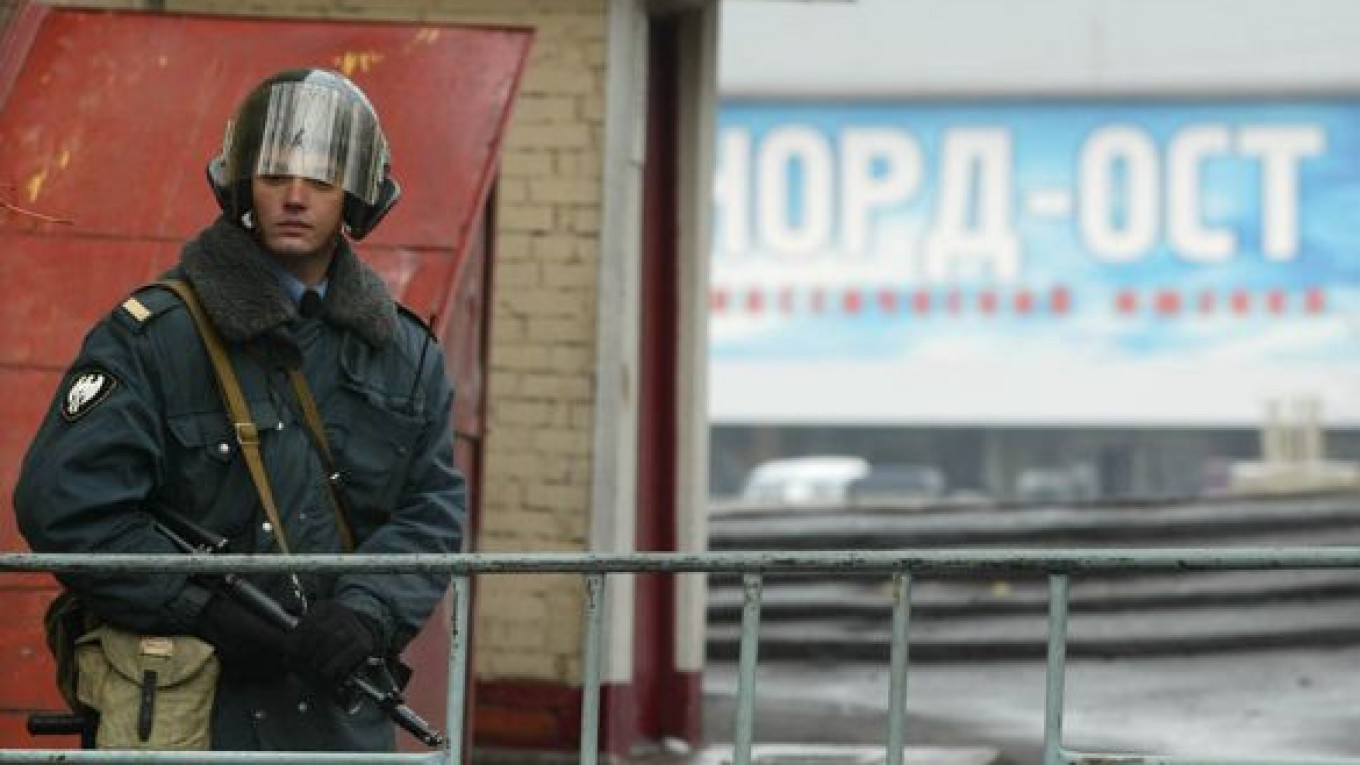Almost a decade after the deadly Dubrovka theater siege, the European Court of Human Rights on Tuesday fined the Russian government about 1.25 million euros ($1.6 million) for violating the rights of hostages who were killed or maimed during the operation to free them.
The Strasbourg court ruled that the authorities were entitled to pump a mysterious gas into the building to knock out the Chechen attackers — and also the hostages — but said they failed to properly plan the rescue operation, violating the hostages' right to life.
A total of 130 people died in the siege, most from the effects of the gas.
Igor Trunov, a lawyer for the victims, praised the court decision as a victory and said it enabled more lawsuits to be filed in Russia, where courts have thrown out most of them previously.
A collective lawsuit against the Russian government was filed with the European court in 2003 by 64 people, all of them survivors of the attack or relatives of the victims.
The overloaded Strasbourg court accepted the case in 2007, but it took until Tuesday for the verdict to be passed.
The claimants were awarded compensation ranging from 9,000 euros to 66,000 euros ($11,700 to $86,000), the court said in a statement on its web site.
In October 2002, a group of 41 Chechen rebels seized the Dubrovka theater in southeastern Moscow, taking hostage more than 800 people during a performance of the "Nord-Ost" musical.
A three-day standoff ended with special forces filling the building with knockout gas and storming the premises. The hostages were freed, but 130, including 10 children, died in the theater or later in hospital, and many others have complained of health problems linked to the gas.
The government has never identified the chemical agent it used or acknowledged that it was to blame for the victims' health problems.
The Strasbourg court ruled Tuesday that there was "no violation" in the "decision by the authorities to resolve the hostage crisis by force and to use the gas."
But the judges pointed at the violations in "the inadequate planning and conduct of the rescue operation" and "the authorities' failure to conduct an effective investigation" into the incident.
Among the violations cited in the lengthy ruling are a failure by authorities to negotiate with the rebels or provide proof that their threats to blow up the building, killing all of the hostages, might be carried out. The court also said the organizers of the rescue operation failed to notify paramedics in time about the use of the gas or to provide an antidote.
The Justice Ministry, which has three months to appeal the ruling, did not indicate Tuesday whether it would. Repeated calls to Russia's representatives in the European Court of Human Rights went unanswered.
Trunov, the lawyer, called the ruling "a certain compromise" because the court had refused to condemn the use of knockout gas as illegal. He said the judges were unable to rule on the matter because the chemical agent's ingredients remained classified.
"The sad thing is that, as a result, we still don't know how to treat people" suffering from the gas' aftereffects, he said.
Victims and their families have lost more than 80 lawsuits in Russian courts, which have only granted compensation to families that lost breadwinners in Dubrovka.
Now some of the old lawsuits may be revived, given that the Constitutional Court decreed last year that rulings of the Strasbourg court can result in domestic retrials.
"Today's decision of the European court means that we have a right to refile suits for damages against the Moscow government that were earlier rejected by Moscow's Tverskoi Court," Trunov said.
In February, Moscow city investigators caved in to pressure from victims and their relatives, agreeing also to reopen an inquiry into the attack that was closed in 2010. The investigation is still ongoing.
All 41 known attackers were killed in the operation that ended the siege, although media reports have claimed that at least several others managed to slip away in the chaos of the assault.
Only one person, Chechen native Zaurbek Talkhigov, has been convicted in connection with the incident, with a Moscow court sentencing him in 2003 to 8 1/2 years in prison for informing the attackers via cell phone about the activities of law enforcement officers during the siege.
A Message from The Moscow Times:
Dear readers,
We are facing unprecedented challenges. Russia's Prosecutor General's Office has designated The Moscow Times as an "undesirable" organization, criminalizing our work and putting our staff at risk of prosecution. This follows our earlier unjust labeling as a "foreign agent."
These actions are direct attempts to silence independent journalism in Russia. The authorities claim our work "discredits the decisions of the Russian leadership." We see things differently: we strive to provide accurate, unbiased reporting on Russia.
We, the journalists of The Moscow Times, refuse to be silenced. But to continue our work, we need your help.
Your support, no matter how small, makes a world of difference. If you can, please support us monthly starting from just $2. It's quick to set up, and every contribution makes a significant impact.
By supporting The Moscow Times, you're defending open, independent journalism in the face of repression. Thank you for standing with us.
Remind me later.






